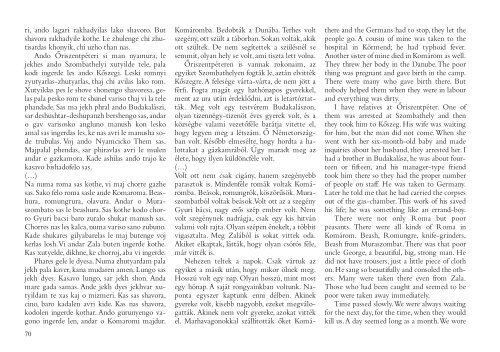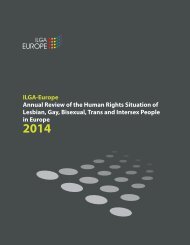Create successful ePaper yourself
Turn your PDF publications into a flip-book with our unique Google optimized e-Paper software.
i, ando lagari rakhadyilas lako shavoro. But<br />
sha vora rakhadyile kothe. Le zhulenge chi zhu -<br />
tisardas khonyik, chi uzho than nas.<br />
Ando Ôriszentpéteri si man nyamura, le<br />
jekhes ando Szombathelyi xutyilde tele, pala<br />
kodi ingerde les ando Kôszegi. Leski romnyi<br />
zyutyarlas-zhutyarlas, thaj chi avilas lako rom.<br />
Xutyildas pes le shove shonengo shavoresa, ge -<br />
las pala pesko rom te shunel variso thaj vi la tele<br />
phandade. Sas ma jekh phral ando Buda kalászi,<br />
sar deshushtar-deshupanzh bershengo sas, andar<br />
o gav varisosko angluno manush kon lesko<br />
amal sas ingerdas les, ke nas avri le manusha so -<br />
de trubulas. Voj ando Nyamcicko Them sas.<br />
Majpalal phendas, sar phiravlas avri le mulen<br />
andar e gazkamora. Kade ashilas ando trajo ke<br />
kasavo bishadofelo sas.<br />
(…)<br />
Na numa roma sas kothe, vi maj chorre gazhe<br />
sas. Sako felo roma sasle ande Komaroma. Beas -<br />
hura, romungrura, olavura. Andar o Mu ra -<br />
szombato sas le beashura. Sas kothe kodo chorro<br />
Gyuri bacsi baro zuralo shukar manush sas.<br />
Chorres nas les kalca, numa variso sano zubuno.<br />
Kade shukares gilyabarelas le maj bu tenge voj<br />
kerlas losh. Vi andar Zala buten ingerde kothe.<br />
Kas xutyelde, dikhne, ke chorroj, aba vi ingerde.<br />
Phares gele le dyesa. Numa zhutyardam pala<br />
jekh pala kaver, kana mudaren amen. Lungo sas<br />
jekh dyes. Kasavo lungo, sar jekh shon. Anda<br />
mare gada samas. Ande jekh dyes jekhvar xu -<br />
tyil dam te xas kaj o mizmeri. Kas sas shavora,<br />
ci no, baro kadalen avri kide. Kas nas shavora,<br />
ko dolen ingerde kothar. Ando gurunyengo va -<br />
go no ingerde len, andar o Komaromi majdur.<br />
70<br />
Komáromba. Bedobták a Dunába. Terhes volt<br />
szegény, ott szült a táborban. Sokan voltak, akik<br />
ott szültek. De nem segítettek a szülésnél se<br />
semmit, olyan hely se volt, ami tiszta lett vol na.<br />
Ôriszentpéteren is vannak rokonaim, az<br />
egyi ket Szombathelyen fogták le, aztán elvitték<br />
Kô szegre. A felesége várta-várta, de nem jött a<br />
férfi. Fogta magát egy hathónapos gyerekkel,<br />
ment az ura után érdeklôdni, azt is letartóztatták.<br />
Meg volt egy testvérem Budakalászon,<br />
olyan tizennégy-tizenöt éves gyerek volt, és a<br />
községbe valami vezetôféle barátja vitette el,<br />
hogy legyen meg a létszám. Ô Német ország -<br />
ban volt. Késôbb elmesélte, hogy hordta a ha -<br />
lottakat a gázkamrából. Úgy maradt meg az<br />
éle te, hogy ilyen küldöncféle volt.<br />
(…)<br />
Volt ott nem csak cigány, hanem szegényebb<br />
parasztok is. Mindenféle romák voltak Komá -<br />
romba. Beások, romungrók, köszörûsök. Mura -<br />
szombatból voltak beások. Volt ott az a szegény<br />
Gyuri bácsi, nagy erôs szép ember volt. Nem<br />
volt szegénynek nadrágja, csak egy kis hitván<br />
valami volt rajta. Olyan szépen énekelt, a többit<br />
vigasztalta. Meg Zalából is sokat vittek oda.<br />
Akiket elkaptak, látták, hogy olyan csórós féle,<br />
már vitték is.<br />
Nehezen teltek a napok. Csak vártuk az<br />
egyi ket a másik után, hogy mikor ölnek meg.<br />
Hosszú volt egy nap. Olyan hosszú, mint most<br />
egy hónap. A saját rongyainkban voltunk. Na -<br />
ponta egyszer kaptunk enni délben. Akinek<br />
gyereke volt, kisebb nagyobb, ezeket megválogatták.<br />
Akinek nem volt gyereke, azokat vitték<br />
el. Marhavagonokkal szállították ôket Komá -<br />
there and the Germans had to stop, they let the<br />
people go. A cousin of mine was taken to the<br />
hospital in Körmend; he had typhoid fever.<br />
Another sister of mine died in Komárom as well.<br />
They threw her body in the Danube. The poor<br />
thing was pregnant and gave birth in the camp.<br />
There were many who gave birth there. But<br />
nobody helped them when they were in labour<br />
and everything was dirty.<br />
I have relatives at Ôriszentpéter. One of<br />
them was arrested at Szombathely and then<br />
they took him to Kôszeg. His wife was waiting<br />
for him, but the man did not come. When she<br />
went with her six-month-old baby and made<br />
inquiries about her husband, they arrested her. I<br />
had a brother in Budakalász, he was about fourteen<br />
or fifteen, and his manager-type friend<br />
took him there so they had the proper number<br />
of people on staff. He was taken to Germany.<br />
Later he told me that he had carried the corpses<br />
out of the gas-chamber. This work of his saved<br />
his life; he was something like an errand-boy.<br />
There were not only Roma but poor<br />
peasants. There were all kinds of Roma in<br />
Komárom. Beash, Romungre, knife-grinders,<br />
Beash from Muraszombat. There was that poor<br />
uncle George, a beautiful, big, strong man. He<br />
did not have trousers, just a little piece of cloth<br />
on. He sang so beautifully and consoled the others.<br />
Many were taken there even from Zala.<br />
Those who had been caught and seemed to be<br />
poor were taken away immediately.<br />
Time passed slowly. We were always waiting<br />
for the next day, for the time, when they would<br />
kill us. A day seemed long as a month. We wore



